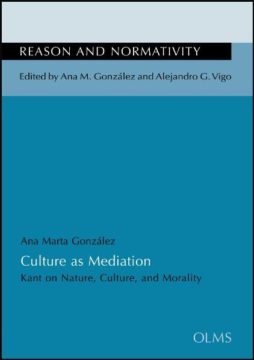Dieses Buch versucht eine begriffliche Klärung von Kants Auffassung von Kultur. Dieser Aspekt seines Denkens ist bisher noch nicht systematisch untersucht worden. Die Autorin hatte zunächst lediglich ein thematisches Interesse an den vielfältigen Bedeutungen des Begriffs „Kultur“ und war überzeugt, dass Kants Moralphilosophie uns den methodischen Rahmen bereitstellen könnte, um die wachsende Relevanz von „Kultur“ im modernen Denken zu verstehen. Insbesondere ging sie von der Annahme aus, dass die Entstehung von Kultur als ein relativ autonomes Reich impliziert war in Kants Weigerung, der Natur eine Rolle bei der Konstitution der moralischen Norm zuzuweisen, und in seiner Forderung, dass die moralische Norm allein durch die reine Vernunft zu definieren sei. Als Ergebnis wäre Kultur auf einer mittleren Ebene anzusiedeln; denn sie ist weder empirische Natur noch reine Moral. Dementsprechend kann man versuchen, Kultur entweder aus der Perspektive der Natur oder aus der Perspektive der Moral zu verstehen. Beide Wege vertreten das, was man als „Kants explizite Darstellung der Kultur“ bezeichnen kann. Hinter dieser expliziten, zweifachen Beschreibung von Kultur lässt sich allerdings eine implizite Darstellung von Kultur im Sinne einer „Projektion der menschlichen Subjektivität“ erkennen. Diese letzte Beschreibung, die selbst eine Konsequenz des kritischen Vorhabens ist, stellt Kants eigenständigsten Beitrag zur Philosophie der Kultur dar.
This book attempts a conceptual clarification of Kant’s approach to culture, given the lack of systematic study of this aspect of his thought. At its origin there was only a thematic interest in the manifold meanings of the term “culture”, as well as the underlying persuasion that Kant’s moral philosophy could provide us with a systematic framework to understand the increasing relevance of “culture” in modern thought. Specifically, the hypothesis was that the emergence of culture as a relatively autonomous realm was implied in Kant’s refusal to let nature play a role in the constitution of the moral norm, and his requirement that the moral norm be defined through pure reason alone. As a result, culture would appear as a middle terrain: being neither empirical nature nor pure morality. Accordingly, culture can be approached either from the perspective of nature, or from the perspective of morality. Both approaches represent what can be termed “Kant’s explicit account of culture”. Behind this explicit, two-fold account of culture, however, an implicit account of culture in terms of “projection of man’s subjectivity” can be discovered. This latter account, itself a consequence of the critical enterprise, constitutes Kant’s most original contribution to the philosophy of culture.
- Veröffentlicht am Mittwoch 6. November 2024 von Olms, Georg
- ISBN: 9783487145532
- 361 Seiten
- Genre: Aufklärung, Hardcover, Philosophie, Renaissance, Softcover
